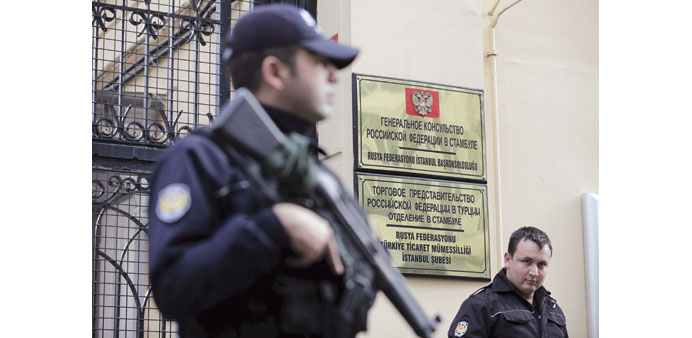Turkish riot police stand guard in front of the Russian Consulate in central Istanbul yesterday. Russian President Vladimir Putin warned of “very serious consequences” for relations after Turkey said its military shot down a Russian warplane that violated its airspace near the border with north-western Syria. The action is the first time in decades that a North Atlantic Treaty Organisation member has downed a Russian military aircraft.
Bloomberg
Istanbul
Turkish stocks fell the most worldwide and the lira led emerging-market currencies lower as the downing of a Russian jet in Syria threatened to escalate tension between the two nations.
Russian President Vladimir Putin warned of “very serious consequences” for relations after Turkey said its military shot down a Russian warplane that violated its airspace near the border with north-western Syria. The action is the first time in decades that a North Atlantic Treaty Organisation member has downed a Russian military aircraft.
“Turkey is a NATO member putting itself at odds right now with another military power,” said Roxana Hulea, a London-based foreign-exchange strategist at Societe Generale. “Such security-related concerns certainly prevail over any other surmountable risk factors.”
The Borsa Istanbul 100 Index tumbled 4.4%, the most in five months, and the lira weakened 0.9% at 5.40pm in Istanbul. Bonds also declined while credit risk increased.
Ambassadors of the 28 NATO member states were meeting at 5pm yesterday in Brussels at Turkey’s request to discuss the incident, the military alliance said in a statement.
The Su-24 jet was warned after violating Turkish airspace and was then downed in line with Turkey’s military rules, state-run Anadolu Agency reported. Prime Minister Ahmet Davutoglu said last month that the nation’s military rules of engagement would apply to any plane that enters its airspace without permission and Russia should act carefully.
Relations between Turkey and Russia, which started a campaign of air strikes in Syria in support of Assad’s forces on September 30, have soured over the Russian intervention. Turkey, which backs rebels seeking Bashar al-Assad’s ouster, has at least twice warned Russia about incursions into Turkish airspace.
Akbank and Turkiye Garanti Bankasi dropped 3.9%, the biggest contributors to declines in the equity benchmark.
The yield on two-year notes rising four basis points to 10.38%. Credit-default swaps insuring Turkey’s debt for five years rose eight basis points to about 253 basis points, according to S&P Capital IQ’s CMA. There are almost 8,000 contracts covering a net notional $8.4bn of Turkey’s debt, according to the Depository Trust & Clearing Corp.
The incident on Turkey’s border rattled investors also faced with the government naming a new cabinet and central bank policy meeting.
Davutoglu named a cabinet that excluded former Deputy Prime Minister Ali Babacan, who had helped steer the $720bn economy during the AK Party’s 13 years in office and was considered key to economic reform by many investors. Former Finance Minister Mehmet Simsek was appointed deputy prime minister and will steer the economic committee.
Turkey’s central bank kept all three of the country’s interest rates unchanged yesterday.
The bank kept its main one-week repo rate at 7.50%, matching the median estimate in a Bloomberg survey of 18 economists. It also kept its overnight lending and borrowing rates at 10.75% and 7.25% respectively, according to a statement posted on its website.
It was the first decision since the ruling AK Party, which has become increasingly vocal in its accusation that the central bank is stymieing economic growth with high interest rates, won a decisive parliamentary election earlier this month. The bank said monetary policy decisions would depend on the inflation outlook, pledging to keep lira liquidity tight “as long as necessary,” citing volatility in energy and food prices.
Policy makers have left the main repo rate on hold since February even as consumer inflation is hovering above 7%, compared with the bank’s 5% target. Governor Erdem Basci said last month that it was “reasonable” to expect the bank to increase interest rates in its first meeting after the US Federal reserve lending costs.

